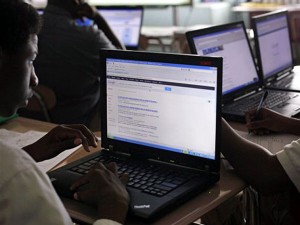10 businesses found using unauthorized software in anti-piracy campaign

Students use computers to perform research during an Advanced Placement government class at the Academy for College and Career Exploration in Baltimore. The United States is set to be overtaken by China, which has the second-highest commercial losses from software piracy—at $9 billion—even as the legal US software market remains many times bigger than in China. AP FILE PHOTO
MANILA, Philippines – In line with its commitment to combat the use of unlicensed software in the country, the Pilipinas Anti-Piracy Team (PAPT) led by the Intellectual Property Office of the Philippines (IPOPHL), Philippine National Police (PNP), Optical Media Board (OMB) and the National Bureau of Investigation (NBI), recently conducted 15 crackdown operations across Metro Manila, Pampanga and Bulacan and found 10 businesses using unauthorized software.
These businesses, which came from various industries, were the following: (1) Dr. Yangas Colleges, Inc.; (2) Integrated School of Montessori; (3) Lloyd Laboratories, Inc.; (4) Meycauayan College; (5) Peregrine Development International, Inc.; (6) S’ Next Philippines, Inc.; (7) Saint Anne’s Catholic High School; (8) Santeh Feeds Corporation; (9) Sto. Niño Academy; and 10) Sumidenso Automotive Tech Asia Corporation.
Twenty-one sacks of assorted pirated CDs including various versions of Microsoft Windows operating systems, Microsoft Office, Xbox games and assorted software installers were discovered during the crackdown. Upon inspection, PAPT required these businesses to show proof of compliance but none were able to do so.
The PAPT has increased the frequency of inspections to strongly reinforce the use of legal software in many industries. In the coming weeks, PAPT will double the number of its reinforcement activities to further ensure that organizations in the country are only using genuine software.
“Piracy breeds across industries and it is not surprising that even some schools were found to be using unlicensed software,” said IPOPHL Director General Ricardo Blancaflor. “Aside from inspections, we are intensifying our efforts on information and education campaigns to build awareness on the detrimental effects of using illegal software such as malware occurrence and disruption in business operations. Organizations should realize that these damages can lead to heavier costs than what investing in genuine software requires.”
Software piracy is a violation of the copyright provisions of the IP code of the Philippines (RA 8293) and Optical Media Act (RA 9239) and carries with it penalties of up to nine years of imprisonment, a fine of up to P1.5 million, or both.
The PAPT, formed in 2005, is comprised of the National Bureau of Investigation, OMB, Philippine National Police and the IPOPHL, which joined the group in 2011. Its aim is to undertake an integrated and coordinated effort by the government to counteract the negative effects of software piracy on the local IT industry and the economy.
Related Stories:
Tech firm denies use of unauthorized software
Bill seeks stiffer piracy penalties
Microsoft warns against use of pirated software
Government intensifies campaign against software piracy














